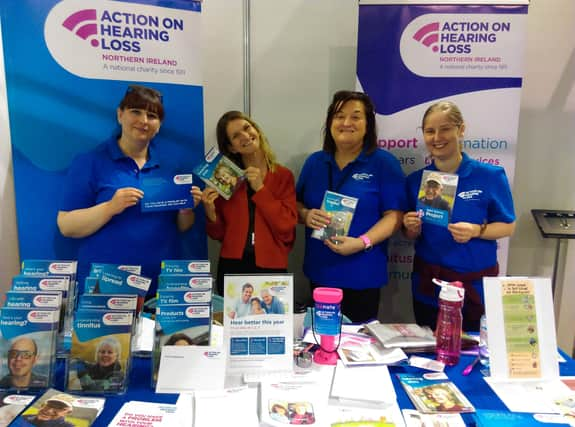How hearing loss charity is reaching out to those in need


Action on Hearing Loss, formally known as the Royal National Institute for Deaf People (RNID), kickstarted the project, named Inform and Connect, in 2017.
Since then have deployed information officers to some of the Province’s most isolated areas, including Omagh, Londonderry, Co Fermanagh, and North Antrim, where they have since delivered more than 240 talks to local health, social care, and voluntary organisations, to help them make their services more accessible to older people with hearing loss.
Advertisement
Hide AdAdvertisement
Hide AdVolunteers ran pop-up information stands in libraries, health centres and GP surgeries in these communities, providing more than 3000 hearing checks and signposting people to local support.
And at the end of last month, the organisation celebrated the success of the project - which will officially reach its conclusion in a couple of weeks’ time - at an event at Ranfurly House Arts & Visitor Centre in Dungannon.
“The feedback has been hugely positive,” the charity’s director, Claire Lavery, tells me.
“It was the fact that we were able to actually go out to them, to their local areas and very small communities, which might be cut off from some services, where maybe their Post Office has closed, or they have no regular bus link, and they feel very isolated.”
Advertisement
Hide AdAdvertisement
Hide AdAnd Claire revealed that the drive had been so well received, that Action on Hearing Loss were “doing a bit of a re-group internally” to see what they could learn and indeed take from it going forward.
“We changed our name about eight years ago, but we have been around for over 100 years,” she says.
“Our main objectives are to provide support to people who are deaf, have hearing loss, and tinnitus
“So we have three distinct audiences who we work with and for. We provide a number of direct support services across the UK and NI to support them both in work and out of work, and we also provide a large number of drop in community sessions for people who need their hearing aids looked at.
Advertisement
Hide AdAdvertisement
Hide Ad“We have a large range of products you can purchase such as flashing doorbells, bedside telephones - products that help people with hearing loss in their daily lives.
“We also invest in research into finding treatments or cures for deafness and hearing loss, and we provide grants to universities and students who are in search for a cure.”
Indeed, these are just a few of the services that the charity provides, but what made it decide that there was a ‘gap’, if you like, in service provision in parts of the Province, namely, the north and west of the country?
“Being an information provider has always been a central part of what we are here to do, and obviously in NI there is a large population who live in rural areas, so we wanted to build on the information service that we already provided,” Claire explains.
Advertisement
Hide AdAdvertisement
Hide Ad“So we targeted Big Lottery money to rural communities, ethnic minority communities, and to people living in nursing and residential homes - basically those people who are furthest away from the information.
“We had staff based in the likes of Omagh and Londonderry, and their job was to get information about what we do out to people who had never seen and heard of it.
“We also work with local libraries, and through that partnership they agreed to take our information into the mobile libraries. So it was really about just trying to increase our reach into the harder to reach areas.”
But why is it so vital that people are made aware of the services they can access via Action on Hearing Loss? Don’t they simply book an appointment with their GP if they suspect they might have a hearing issue?
Apparently, rather worryingly, they don’t, Claire says.
Advertisement
Hide AdAdvertisement
Hide Ad“People don’t value their hearing in the same way as they might value some of their other senses,” she says.
“When people have an issue with their sight, for example, they’ll tend to go to their optician fairly quickly, however with their hearing, research shows that it takes on average 10 years before people actually do anything.
“And often, that is triggered by the pressure of their families, who might say, look, you have the TV up really loud, or you’re missing out on conversation, or you’re difficult to talk to on the phone - you really need to do something.
“We can offer a hearing check out in the communities so that people don’t have to present themselves to their GP to be checked first.
Advertisement
Hide AdAdvertisement
Hide Ad“The sooner you can get a hearing aid fitted, the more benefit you will get from it, because the less sound it has to find and make up for.”
As Claire summarises, some people simply “don’t understand the significance of hearing loss or take it seriously”, even thought it’s an issue that affects thousands of people.
She added: “Thanks to the dedication of our staff and our volunteers, many people are now better informed, more confident, and have taken steps to manage their hearing loss; whether to see their GP, visit a local hearing aid user support session, or access our specialist tinnitus support service.”
l To contact Action on Hearing Loss, call 028 9023 9619 or email [email protected]